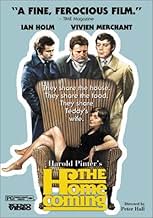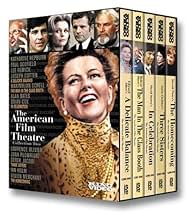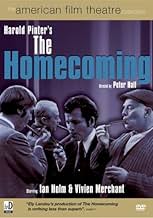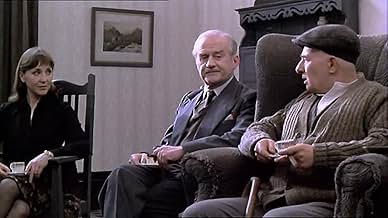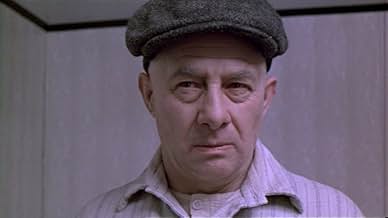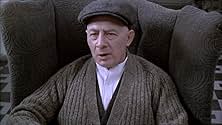Füge eine Handlung in deiner Sprache hinzuIn a dreary North London flat, the site of perpetual psychological warfare, a philosophy professor visits his family after a nine-year absence, and introduces the four men, father, uncle, an... Alles lesenIn a dreary North London flat, the site of perpetual psychological warfare, a philosophy professor visits his family after a nine-year absence, and introduces the four men, father, uncle, and two brothers, to his wife.In a dreary North London flat, the site of perpetual psychological warfare, a philosophy professor visits his family after a nine-year absence, and introduces the four men, father, uncle, and two brothers, to his wife.
- Nominiert für 1 BAFTA Award
- 1 Gewinn & 1 Nominierung insgesamt
Empfohlene Bewertungen
Yes, it is Pinter at his peak, and most of the cast knew the play well (the new cast members probably only added freshness) from done long runs years before. Having seen most of them, I would say this must surely be the jewel in the AFT crown. Unlike the Pinter directed "Butley" it has grown rather than diminished by the years.
This is one of those film plays (Glengarry Glen Ross may be another) does commit the crime of doing the play so well that it pretty much makes further productions useless. The film of "The Caretaker" done some years earlier is also very strong.
A few of the other commentators have questioned whether it works as a piece of 'cinema'. But with writing and acting this vital and rich the query becomes redundant. It's a filmed record of a stage play in which color and framing are used to provide texture and ambiance for the text. The absence of any unnecessary cinematic flourishes contributes to the stark, claustrophobic atmosphere.
I would argue that the piece is more effective here, atmospherically speaking at least, than it ever could be on stage. The screen filling close-ups, slow fades to black, and subtle, almost imperceptible camera movement all add the palpable sense of entrapment, tension and menace.
The performances are all majestic. But my favourite is the astonishing one given by the wonderful Vivien Merchant. Her work in this and Sidney Lumet's 'The Offence' (in the same year) stand, for me, as being amongst the greatest performances given on screen by any actor. Ever. She can switch from poignantly lost and alone, to ironic, to chillingly manipulative with a glance. Whilst always radiating an almost heartbreaking aura of emotional privation and defeat. Her premature death was a genuine tragedy.
Am I alone in finding such a spare, bleak work so strangely comforting, even uplifting? I hope not.
It's a fine adaptation of this one-set play, and director Peter Hall leaves it in that set - there is one shot where Miss Merchant steps onto the street for a walk. He does move the camera around for a constant variation in viewpoint. The actors, who include Cyril Cusack and Ian Holm (the role won his m a Tony) is superb.
I have some aesthetic issues with Pinter's works. Like Albee's WHO'S AFRAID OF VIRGINIA WOOLF? this is an exercise in revealing the ugly sides of people in a constant storm of abuse. The plot, therefore, consists of the revelation of character to the audience, rather than the more usual arc of character change. I also wonder - probably irrelevantly - about Pinter's home life. The IMDb claims that Pinter's family was close. Why then did he write plays about the miseries of being in a family?
I think that if you wish to see what it looks like when you grind five thousand feet of misery, this is a fine movie. Me, I think I'll watch a comedy.
Wusstest du schon
- WissenswertesSir Ian Holm won the 1967 Tony Award (New York City) for Supporting or Featured Actor in a Drama for "The Homecoming" as Lenny. He reprised the role in this movie.
- Zitate
Max: Mind you, she wasn't such a bad woman. Even though it made me sick just to look at her rotten stinking face, she wasn't such a bad bitch. I gave her the best bleeding years of my life, anyway.
Lenny: Plug it, will you, you stupid sod, I'm trying to read the paper.
Max: Listen! I'll chop your spine off, you talk to me like that! You understand? Talking to your lousy filthy father like that!
Lenny: You know what, you're getting demented.
- VerbindungenReferenced in Jake's Progress (1995)
Top-Auswahl
- How long is The Homecoming?Powered by Alexa
Details
- Erscheinungsdatum
- Herkunftsländer
- Sprache
- Auch bekannt als
- Harold Pinter's The Homecoming
- Drehorte
- Hackney, London, Greater London, England, Vereinigtes Königreich(outside scenes)
- Produktionsfirmen
- Weitere beteiligte Unternehmen bei IMDbPro anzeigen
- Laufzeit1 Stunde 51 Minuten
- Sound-Mix
- Seitenverhältnis
- 1.78 : 1
Zu dieser Seite beitragen




